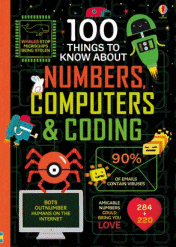
100 Things to Know About Numbers, Computers & Coding
100 Things to Know About Numbers, Computers & Coding
Alice James
Usborne, 2018
128pp., hbk., RRP $A19.99
9781474942997
Did you know that out of 30 million emails sent in the time it takes to tread this line, 20 million of them will be spam?
That a champion mathlete can add ten 10-digit numbers in their head in 13 seconds?
The first computer game for two players was based on playing tennis and was created over 60 years ago?
These are just some of the interesting facts that are shared and explained in this fascinating new book from Usborne that is so easy to explore, navigate and read.
Way back when, in a time when I did not teach maths well and avoided it if I could, I was presented with a class of eight-year-olds who were as turned off the subject as I was. In the days when text books and workbooks were the norm and the curriculum comprised going through said books which were cheaply produced, unattractive and unappealing, it was no wonder that those for whom maths was a mystery were not enthused to participate. However, I was a successful “language arts” teacher and so in the interests of my students, I had to invigorate my interest and so I examined what I did well in my whole language classroom and translate it into a whole maths classroom. By the end of the year, we were all thriving, I’d written many articles about my approach and even had several book contracts lined up!
The secret was to show the kids how maths related to their everyday lives, in both overt and obscure ways so that it became apparent that it permeates everything we do. We started with a focus question of “What would we do without numbers?” and delved into the history of number and so on, and things just flew from there. This book, 100 Things to Know About Numbers, Computers & Coding would have been a godsend in those days as even though its focus is computing and coding, there is enough in it to build a lesson a day for almost an entire school year and that doesn’t include the offshoot investigations that would take you off on a tangent! I can envisage those eight-year-olds of 30 years ago pouring over it!
There are often queries to teacher librarian forums about how to engage with the maths teachers to show that the library offers them something, and the usual answers of teaching the Dewey Decimal System pop up, but imagine the interest there would be if you shared a fact a day and invited explorations as part of your library displays! Those who see libraries as being about books and reading and therefore not for them would be engaged and their learning could go off in any direction, while not even realising they are engaging with reading, books and information literacy. Sort of like hiding vegetables in cakes.
Don’t buy this book and hide it away in the 004 section. Buy it and use it as the basis to turn students’ attitudes towards maths, computing and coding into something positive!